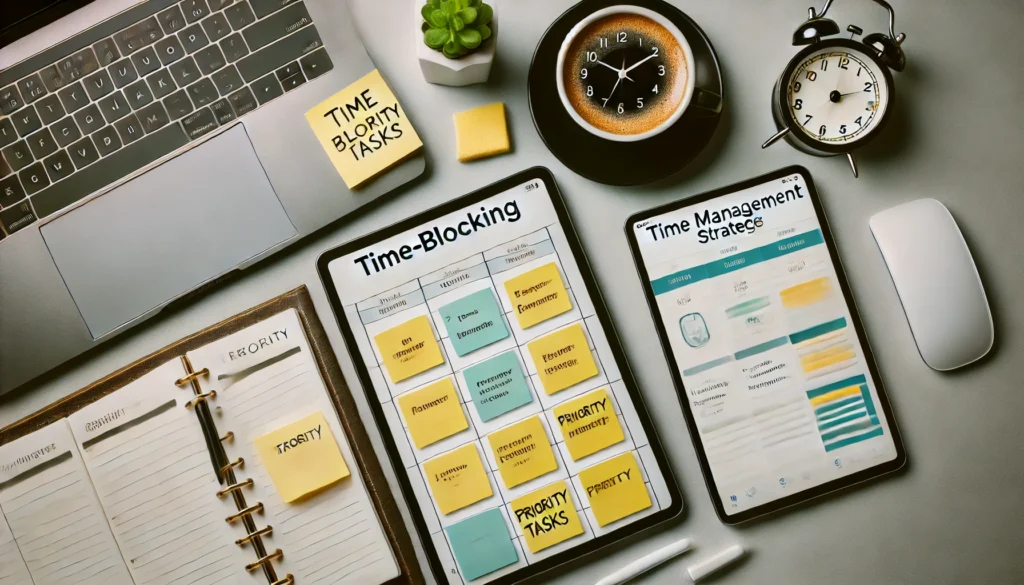Time management is the methodical process of planning and exercising conscious control over the amount of time allocated to specific tasks. The primary objective of time management is to boost efficiency and productivity, empowering individuals to achieve more in a shorter span. Effective time management not only alleviates stress but also enhances job performance and fosters a healthier work-life balance.
You may also like: Effective Time Management Methodologies for Success
What Falls Under Time Management?
Time management encompasses a broad array of strategies and techniques designed to help individuals prioritize tasks, set goals, and effectively allocate their time. It involves making informed decisions, setting clear boundaries, and understanding one’s limitations. At its essence, time management is about cultivating a structured approach to planning and organizing time for various activities.
- Task Prioritization: At the heart of time management lies the ability to prioritize tasks effectively. This involves distinguishing between what’s urgent and important, ensuring that high-impact tasks receive the attention they deserve.
- Goal Setting: Setting clear, achievable goals is vital for directing your tasks. Defining precise goals not only provides clarity but also motivates action, guiding your daily efforts toward tangible outcomes.
- Time Allocation: Time management requires the deliberate allocation of time to different tasks. Developing a structured schedule helps avoid overlapping commitments and ensures each task receives adequate attention. A well-balanced schedule is crucial for managing responsibilities effectively without feeling overwhelmed.
- Boundary Setting: Establishing firm boundaries between work and personal time is crucial. It prevents burnout and ensures that personal time is protected, leading to a more balanced life.
- Decision-Making Skills: Time management involves making swift, informed decisions about where to focus your energies. Enhancing decision-making skills leads to more effective time use and increased productivity.
The Importance of Time Management
Effective time management is indispensable for reaching personal and professional milestones. It enhances organization, boosts productivity, and alleviates the stress of looming deadlines. Mastering time management improves focus, sharpens decision-making skills, and ultimately paves the way for a balanced and fulfilling life. Discover how effective time management can transform both professional and personal aspects of life.
Benefits of Time Management
- Increased Productivity: Allocating time efficiently allows for the swift and accurate completion of tasks, enhancing overall productivity. By eliminating wasted time, you can achieve more in your day.
- Reduced Stress: Thoughtful planning mitigates the pressure of last-minute rushes and the anxiety they bring. By having a clear plan, you can approach tasks calmly and confidently.
- Improved Focus: Time management helps maintain concentration on high-priority tasks by minimizing distractions. This focused approach leads to higher quality work and faster completion times.
- Better Decision Making: With a clear roadmap, you can make informed choices about how to spend your time, optimizing the benefits of each activity. This clarity reduces decision fatigue and enhances task execution.
- Enhanced Work-Life Balance: By managing time wisely, you can create a harmonious balance between professional obligations and personal interests. This balance is key to long-term happiness and well-being.
Time Management Techniques for Professionals
Prioritization
Understanding and ranking tasks by importance and urgency is fundamental to effective time management. Utilizing tools like the Eisenhower Box, a decision-making matrix, assists individuals in categorizing tasks to ensure that critical activities are addressed promptly. Choosing the right time management approach can make prioritization more effective, allowing individuals to optimize their workflow. Learn more about different strategies to find a system that best suits your needs.

- Urgency vs. Importance: Distinguish between tasks that are urgent and those that are important. Focusing on important tasks that are not urgent helps prevent crises and promotes long-term success.
- Task Categorization: Break down tasks into categories based on their impact and deadlines. This categorization aids in identifying which activities warrant immediate attention.
- Balancing Competing Priorities: Learn to balance multiple priorities by assessing their relative importance and deadlines. Developing this skill ensures that no critical task is neglected.
Goal Setting
Establishing clear, achievable goals provides your tasks with purpose and direction. The SMART criteria (Specific, Measurable, Achievable, Relevant, Time-bound) offer a robust framework for setting goals that drive meaningful progress.
- Defining Clear Objectives: Clearly defined objectives provide a roadmap for success. Ensure that your goals are specific and aligned with your broader vision.
- Measurable Outcomes: Create goals that are quantifiable, enabling you to track progress and make adjustments as needed. Measurable outcomes foster accountability and motivation.
- Achieving Relevance: Ensure that each goal is relevant to your personal or professional aspirations. Aligning goals with your core values enhances motivation and commitment.
- Time-Bound Milestones: Set deadlines for each goal to maintain momentum and prevent procrastination. Time-bound milestones provide a sense of urgency and help prioritize tasks.
Time Blocking
Time blocking involves designating specific periods for various activities, preventing multitasking and promoting deep work. This technique ensures that each task receives the necessary focus and time allocation, enhancing productivity. Using calendar-based strategies can significantly improve time-blocking effectiveness, making it easier to manage and track scheduled tasks. Learn how to integrate these methods into your daily routine for better results.
- Creating a Structured Schedule: Develop a detailed schedule that allocates specific time slots for different tasks. This structure helps avoid conflicts and ensures comprehensive task coverage.
- Deep Work Sessions: Allocate uninterrupted time for complex or high-priority tasks, allowing for deep work. These focused sessions enhance concentration and output quality.
- Balancing Flexibility and Structure: While structure is crucial, it’s important to remain flexible to accommodate unexpected events. Balancing structure with adaptability ensures resilience in your schedule.
- Reviewing and Adjusting Blocks: Regularly review your time blocks to assess their effectiveness. Make necessary adjustments to enhance efficiency and align with changing priorities.
The Pomodoro Technique
The Pomodoro Technique involves dividing work into intervals, traditionally 25 minutes long, separated by short breaks. This technique is especially useful for students and professionals who need to sustain focus while managing workloads efficiently. Discover how the Pomodoro method can enhance time management and academic success.
- Interval Work Sessions: Work in short, intense bursts to maximize concentration and output. These intervals help maintain energy levels and prevent fatigue.
- Regular Breaks: Incorporate brief breaks between work sessions to recharge and maintain focus. These breaks are essential for sustaining long-term productivity.
- Tracking Progress: Monitor your progress during each interval to assess efficiency and make adjustments as needed. This tracking fosters accountability and helps identify areas for improvement.
- Adapting Intervals: Customize the length of work intervals and breaks to suit your personal work style. Tailoring intervals enhances effectiveness and personal comfort.
Delegation
Recognizing that you cannot accomplish everything independently is vital. Delegating tasks allows you to focus on high-priority activities that leverage your unique skills and expertise.
- Identifying Delegable Tasks: Assess tasks to determine which can be delegated to others. Delegating non-essential tasks frees up your time for critical activities.
- Choosing the Right Delegate: Select individuals with the appropriate skills and resources to effectively handle delegated tasks. Ensuring the right fit enhances task execution and outcomes.
- Communicating Clearly: Provide clear instructions and expectations for delegated tasks. Effective communication ensures that tasks are completed accurately and efficiently.
- Monitoring and Feedback: Monitor the progress of delegated tasks and provide constructive feedback. Regular feedback helps maintain quality and encourages professional growth.
Effective delegation can also enhance team productivity and overall performance. Understanding how to delegate strategically can lead to more efficient workflows and improved team dynamics.
How to Improve Time Management Skills
Improving time management skills requires practice and reflection. By refining time management techniques, individuals can significantly improve their productivity and efficiency. Explore methods that help you achieve more in less time.

Reflect and Adjust
Regularly reviewing how you spend your time and adjusting strategies as necessary can significantly enhance efficiency. This process involves identifying areas for improvement and implementing changes to streamline your routine.
- Conducting Time Audits: Periodically assess how you spend your time to identify inefficiencies. Time audits provide insights into habitual patterns and areas for improvement.
- Setting Improvement Goals: Establish specific goals for enhancing time management skills. These goals guide your efforts and provide a benchmark for measuring progress.
- Adapting Strategies: Be open to experimenting with new strategies and techniques. Flexibility allows you to discover what works best for your unique circumstances.
- Seeking Feedback: Solicit feedback from peers or mentors on your time management practices. External perspectives can provide valuable insights and areas for enhancement.
Limit Distractions
Identifying common distractions and finding ways to minimize them is crucial for maintaining focus. This may involve setting boundaries with coworkers or leveraging technology to block distracting websites.
- Identifying Common Distractions: Recognize the sources of distraction in your environment. Awareness is the first step in mitigating their impact.
- Implementing Boundaries: Establish clear boundaries to minimize interruptions. Communicate these boundaries to colleagues to foster a focused work environment.
- Utilizing Technology: Use apps and tools to block distracting websites or notifications. Technology can be a powerful ally in maintaining focus.
- Creating a Conducive Environment: Arrange your workspace to minimize distractions and promote concentration. A well-organized space enhances productivity and focus.
Implementing evidence-based time management techniques can further enhance focus and minimize interruptions. Research-backed strategies offer valuable insights into optimizing productivity.
Use Technology
Leveraging technology can significantly aid time management efforts. Tools like calendar apps, task management software, and time-tracking apps help keep you organized and on track. Professionals can benefit from structured time management plans that integrate technology to streamline tasks. Explore practical digital solutions that enhance organization and efficiency.
- Calendar Management: Utilize digital calendars to schedule tasks and appointments. Calendar management ensures that deadlines are met and commitments are honored.
- Task Management Software: Implement task management tools to organize and prioritize tasks. These tools provide a clear overview of responsibilities and deadlines.
- Time-Tracking Apps: Use time-tracking apps to monitor how you spend your time. These apps help identify areas for improvement and optimize task allocation.
- Automation Tools: Leverage automation tools to streamline repetitive tasks. Automation frees up time for more strategic activities.
Practice Mindfulness
Mindfulness enhances focus and concentration, essential components of effective time management. Incorporate mindfulness practices, such as meditation or deep breathing, into your daily routine to boost your mental clarity.
- Mindful Breathing Exercises: Practice deep breathing exercises to center your thoughts. These exercises reduce stress and enhance concentration.
- Meditation Practices: Incorporate meditation into your daily routine to improve focus. Meditation promotes mental clarity and enhances decision-making abilities.
- Mindful Time Management: Approach time management with mindfulness, being fully present in each task. This practice enhances engagement and task quality.
- Reflective Journaling: Maintain a journal to reflect on your time management experiences. Journaling provides insights and fosters continuous improvement.
Coping with Poor Time Management
Struggling with time management necessitates identifying the root causes. Common challenges include procrastination, lack of motivation, and inefficient task management. Address these issues with targeted strategies, such as breaking tasks into smaller, manageable parts, establishing a reward system, or seeking professional guidance if necessary.
- Identifying Root Causes: Analyze your time management challenges to pinpoint underlying causes. Understanding these causes is the first step in addressing them.
- Breaking Tasks into Manageable Parts: Divide larger tasks into smaller, more manageable components. This approach reduces overwhelm and promotes steady progress.
- Establishing a Reward System: Implement a reward system to motivate task completion. Rewards provide positive reinforcement and encourage consistency.
- Seeking Professional Help: Consider seeking professional assistance if time management issues persist. Professional guidance can offer tailored strategies for improvement.
Implementing proven time management techniques can help address these challenges effectively. Discover how structured strategies can combat poor time habits and improve overall efficiency.
Conclusion: Managing Time and Priorities
Time management transcends merely managing hours; it encompasses managing yourself. In academic and professional settings, mastering time management is essential for sustained success. By implementing effective time management strategies, you can prioritize tasks, reduce stress, and achieve a more balanced and fulfilling life. Remember, time is a finite resource, and your choices in spending it shape your success and happiness.

Incorporate these comprehensive tips and tricks into your daily routine to master the art of time management, transforming your productivity and overall well-being. With dedication and practice, you can harness the power of time management to unlock your full potential and lead a more organized and satisfying life.
Further Reading:
Mastering your schedule: effective time management strategies for success
15 Essential Time Management Techniques For Peak Productivity
10 Time Management Skills and Techniques for Students
Important Note: The information contained in this article is for general informational purposes only, and should not be construed as health or medical advice, nor is it intended to diagnose, prevent, treat, or cure any disease or health condition. Before embarking on any diet, fitness regimen, or program of nutritional supplementation, it is advisable to consult your healthcare professional in order to determine its safety and probable efficacy in terms of your individual state of health.
Regarding Nutritional Supplements Or Other Non-Prescription Health Products: If any nutritional supplements or other non-prescription health products are mentioned in the foregoing article, any claims or statements made about them have not been evaluated by the U.S. Food and Drug Administration, and such nutritional supplements or other health products are not intended to diagnose, treat, cure, or prevent any disease.


